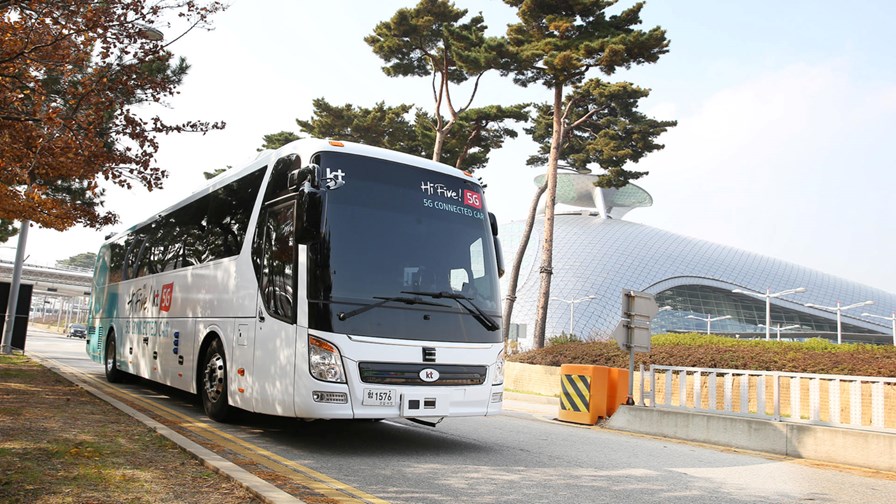
© KT
- Self-driving bus tested at Seoul’s Incheon International Airport
- Part of KT’s 5G as a Vehicle Platform (5GaVP) project
- Vehicle covered 2.2km at a speed of 30km/h
- No sign of when we’ll see these vehicles deployed
News arrives of yet another autonomous vehicle test, this time in South Korea. It’s not a particular ground-breaking test: a driverless bus covers 2.2km at a speed of 30km/h outside the airport’s Terminal 1, slowing down at traffic signals and changing lanes to avoid obstacles. Waymo and all its peers have clocked up far, far more miles and tested in much more challenging environments. However, it does illustrate the platform model that a few CSPs are investigating for future 5G-related verticals.
South Korea’s KT is developing its 5GaVP (5G as a Vehicle Platform) concept, which it describes as a commercial self-driving platform using its 5G technology. KT’s 5G technology, as it seeks to become a global leader in autonomous vehicle technology. That’s a big ask. In the meantime, it has also developed its GiGA Drive IVI (in-vehicle infotainment), a smart, voice-recognition platform for connected cars that combines information and entertainment for drivers and passengers. It includes an Advanced Driver Assistance System (ADAS), which alerts the driver to potential dangers.
As for when we’ll start to see autonomous vehicles in actual commercial use, that’s still highly subjective. But whilst there is still a massive amount of R&D and testing still required, the automotive industry is heading for huge disruption, whether the “human drivers first” movements like it or not. And politicians and regulators are preparing for it now.
Case in point, the UK has opened a consultation on the legal framework for automated vehicles and their use as part of public transport networks and on-demand passenger services. The Centre for Connected and Autonomous Vehicles (CCAV) has asked the Law Commission to undertake a review, and the preliminary consultation closes on 8 February 2019. At which time, they will then consult on the regulation of automated vehicles in public transport and mobility as a service, delivering final recommendations by March 2021.
They are looking to cover three key themes: how safety can be assured before automated vehicles are placed on the market; criminal and civil liability; and the need to adapt road rules for artificial intelligence. There’s a summary available here that is well worth a read, and don’t worry, there’s not a single mention of 5G…
Original Press Release:
KT Corp. Tests Driverless Bus at Incheon Int’l Airport
2018-11-16
- KT and IIA Tests Autonomous Bus for First Time at Korean Airport -
- Two Partners Agree to Cooperate in 5G Networks, AI, Big Data and IoT -
SEOUL, South Korea (November 16, 2018) – KT Corp. (KRX: 030200; NYSE: KT), South Korea’s largest telecommunications company, successfully tested a self-driving bus at the country’s largest international airport this week, the latest showcase of its autonomous vehicle technology and innovation.
At Incheon International Airport (IIA) on November 11, KT’s driverless bus covered 2.2 kilometers at a speed of 30 kilometers per hour outside the airport’s Terminal 1. The self-driving vehicle slowed down at traffic signals and changed lanes to avoid obstacles. Airport employees and officials from the Ministry of Land, Infrastructure and Transport watched the demonstration.
Last month, the Korean telecom leader signed an agreement with the Incheon International Airport Corporation to develop a new intelligent airport based on information and communications technology (ICT). The two partners plans to expand cooperation into the areas of fifth-generation (5G) mobile networks, artificial intelligence (AI), big data and Internet of Things (IoT).
To become a global leader in autonomous vehicle technology, KT is developing the 5GaVP (5G as a Vehicle Platform), a commercial self-driving platform using its innovative 5G technology. KT’s 5G technology was demonstrated as the world’s first pilot network service during the Pyeongchang Winter Olympic Games in February this year.
KT has also developed GiGA Drive IVI, a smart, voice-recognizing platform for connected cars. IVI, or in-vehicle infotainment, is a system that combines information and entertainment for drivers and passengers.
KT’s IVI platform provides diverse information from directions to traffic conditions. Destinations can be set automatically by linking the vehicle with a mobile device. It includes an Advanced Driver Assistance System (ADAS), which alerts the driver to danger and uses next-generation intelligent transport system technologies to visualize driving information.
Email Newsletters
Sign up to receive TelecomTV's top news and videos, plus exclusive subscriber-only content direct to your inbox.




